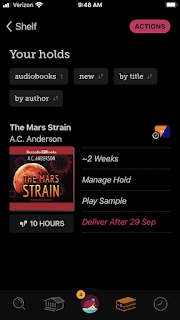The Mars Strain available now on Libby
What’s on my mind this week changed as I listened to Jeffe’s First Cup Of Coffee podcast this morning. She talked about the old adage writers need to have thick skin in order to survive in the book business, but how that isn’t exactly the best advice/most accurate.
And it really struck a chord. When I started out writing I was managing a cancer center—I ate confrontation for breakfast and I had confidence in spades. I knew my writing was capable of moving people to tears and could earn a few laughs, and even though I acknowledged that I had room to grow and improve, I knew it was worth pursuing.
For those that don’t know, first you have to write the thing AND THEN you have to get the book out there. It’s in the getting it out there that you need a thick skin because as soon as your work leaves your hands people will subject it to their own notions and ideals and you have zero control over how it will make them feel or how they will react to it. As an author you have to have confidence in your work or you will never reach the goal of producing a book, no matter what publishing track you choose.
I only queried about twenty agents and received a few helpful passes, meaning they weren’t copy-paste formatted rejections. I pitched my novel to a few agents at a conference and received even more helpful passes. I had thick skin and the negative comments glanced off my shoulder as I clutched onto the praise. Yada, yada, yada—sorry, I can’t say I had a lobster bisque—but, I ended up with a wonderful agent.
With that wonderful agent I went out on submission with the second book I’d ever written. It was exciting! It was nerve wracking. It took forever. But as with the queries, the negative stuff that came from the personalized passes glanced off and I clung to the parts they loved.
And then something happened. Well, a few things happened and a decline in health was one of them. I’ve talked about depression before, you can check it out here if you’re curious, and it’s not something I’d wish on anyone. It’s also not conducive to having a thick skin.
Suddenly, I found myself flinching at every pass, every turned up nose, and every negative response…including from my agent. It happened so many times that I got to a point I couldn’t bring myself to send them anything. I was mentally blocked. My thick skin had failed me utterly.
This is why Jeffe’s ruminating resonated so deeply with me today. It took me back to that place of vulnerability and it made me realize that I’m still kinda there. I’ve paused my next steps because of it and I don’t know that I’ll ever get my thick skin back.
But maybe I don’t have to…is having thick skin the wrong idea?
As creatives we need to feel, we can’t stop the emotions. So how do we deflect, or as Jeffe put it, find a laser big enough to shoot down the space junk on a crash-course trajectory?
*Jeffe, you were onto something with that analogy! I like it!*
I guess I’m going to try build a strong enough support system around me so when an asteroid hits, I’m able to lean to one side or the other and avoid getting blasted. It's bound to happen, unless I quit this crazy business, and I'll receive more passes and negative criticism on what I've written. And yes, I'll always react and have feelings, but if I can gain enough confidence from my support it'll strengthen my own shields so I don't have to laser as many.
Having support, a community, friends that understand what you’re going through…that’s far better than having tough skin. I’m going to test out a new adage. Let’s say: to make it in the publishing business and get your words out in the word, you need to have a support system.
And thanks to my support system, The Mars Strain is officially available on Libby! Libby is the app my library uses for audiobooks and if your library uses it too, you can check it out! I think that's how it works anyway.
What do you think?




























